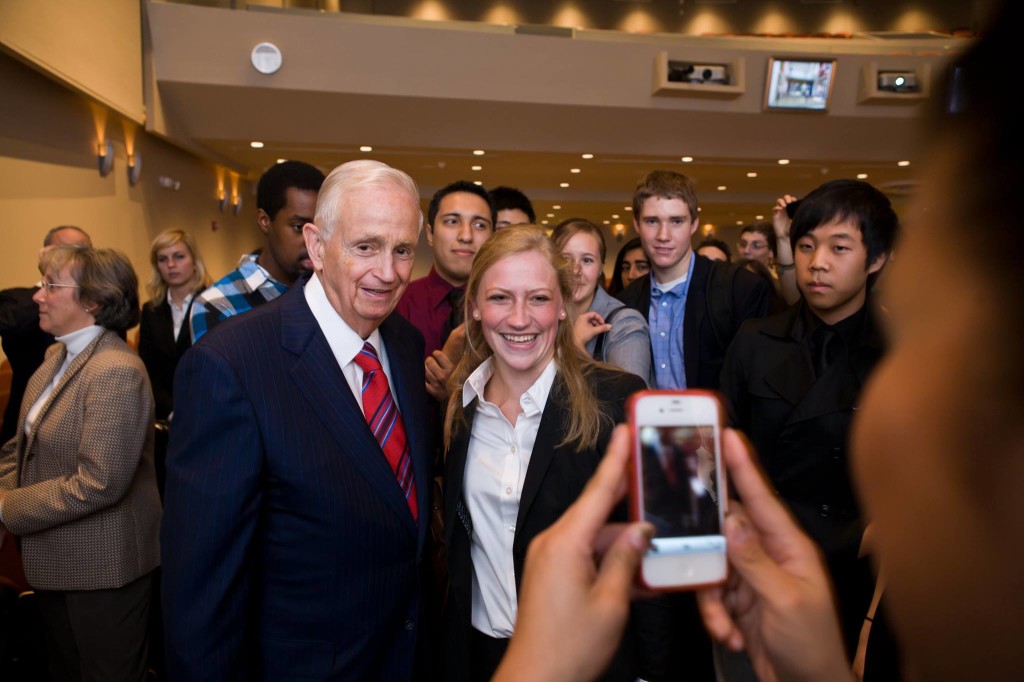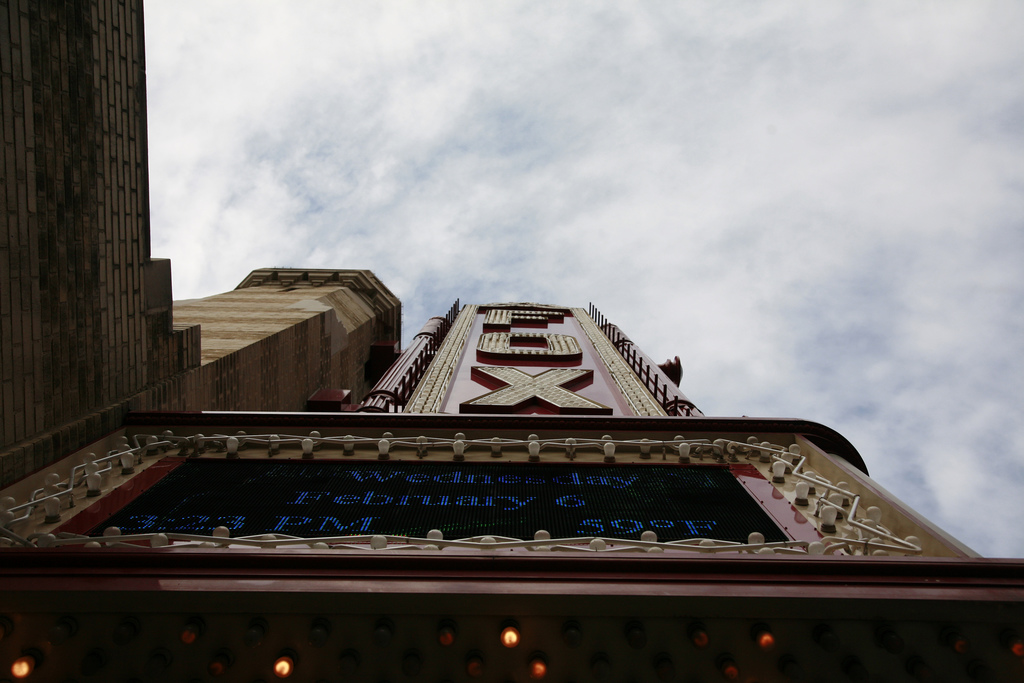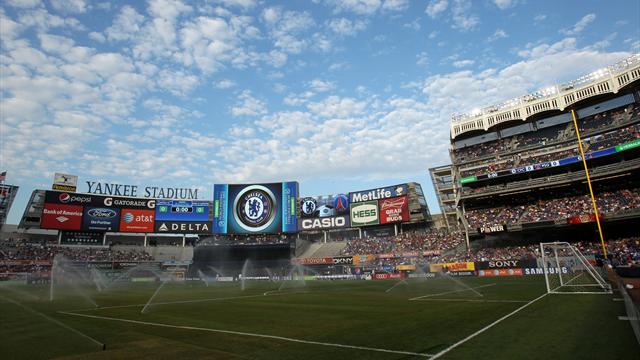Ted DeDee, CFE, Honored as an Executive of the Year
Ted DeDee, CFE, an IAVM member and president and CEO of the Overture Center for the Arts in Madison, Wisconsin, was recently named “Medium Company Executive of the Year” by In Business magazine. Here’s a part of why he was honored with the award:
Check out the article for more about DeDee and the award, and please share your congratulations in the comments below.
12 Rules to Follow to be a Successful Leader
Bill Marriott is one of the most respected businessmen and leaders in the hospitality industry. His father taught him to achieve excellence in everything he does. When he was tapped to lead the namesake hotel company, he created his own 12 rules of success, which he shared on his blog yesterday.
1. Challenge your team to do better and do it often.
2. Take good care of your associates, and they’ll take good care of your customers, and they’ll come back.
3. Celebrate your peoples’ successes, not your own.
4. Know what you’re good at and keep improving.
5. Do it and do it now. Err on the side of taking action.
6. Communicate by listening to your customers, associates, and competitors.
7. See and be seen. Get out of your office, walk the talk, make yourself visible and accessible.
8. Success is always in the details.
9. It’s more important to hire people with the right qualities than with specific experience.
10. Customer needs may vary, but their bias for quality never does.
11. Always hire people who are smarter than you are.
12. View every problem as an opportunity to grow.
“‘Hire friendly, train technical’ is the most important mantra in our HR manual,” Marriott wrote in previous blog post. “I want passionate associates who go the extra difference to help a guest. I want associates whose enthusiasm for their hometown rubs off on guests. Guests know the difference between a forced smile and a genuine one.”
These rules are applicable for any organization that wants to court success. Which one(s) do you follow the most?
(Image: Marriott International Facebook page)
Eat More Spinach and Eggs for Faster Reflexes
A way to achieve faster reflexes is to eat more spinach and eggs. According to research out of Leiden University and the University of Amsterdam, ingesting tyrosine increases your reaction speed. Tyrosine is found in such foods as cottage cheese, soya, and the aforementioned spinach and eggs.
Really, though, you should just go ahead and watch the above video for more information. It features a Kraftwerk soundtrack and 60’s psychedelic transitions. You know, exactly what you’d think of when talking about food and science.
The Book of Snowstorm
We all know it is not uncommon for weather to affect operations no matter what region of the country; however, the impact can be enormous for your patrons and staff. As many are aware, the southeast was hit recently not once, but twice, both resulting in the cancellation of events that had either capacity or near-capacity audiences. Certainly there is always a learning curve in the messaging and communication in any emergency situation, and we became experts by the second storm. However, I feel that the biggest lesson we learned at the Fox Theatre was from our “on the ground emergency response team.”
The first storm resulted in the cancellation of two performances of The Book of Mormon. While upper management worked feverishly with Broadway Across America and the show’s producers, it was really the hourly employees who were the glue that kept it all together. Many slept on the floor on areas of the theatre overnight so that they could be “first responders” to the thousands of calls and emails from ticket-holders. Foregoing family, these front line folks stayed for up to 36 hours in order to return calls, facilitate exchanges, and pacify our panicked patrons. Staff members were using packing blankets for bedding and raiding lost and found. All were thrilled to return home after their extended “shift” and get out of clothes that had been worn for longer than I care to share! It was truly the Foxified version Survivor, except no one left the island.
Round two of winter weather was predicted to be worse than the first; however, we were prepared and had a much better accommodation situation (storm No. 1 took place during the Poultry Convention, so there was not a feather pillow to be found on which to rest a weary head). The troops were corralled, overnight bags were packed, and management fully supported the use of the hotel across the street.
We started early communication with the management team for Ailey, and together a game plan was prepared in advance. The Ailey team was very receptive to our recommendations and consensus regarding the plan. The messaging was so effective that not a single patron showed up for the canceled performance—an almost unheard of thing.
Through all of this, I was truly amazed at the tireless efforts of our all staff who willingly dedicated their time to the Fox over family and home. While management certainly supported these efforts by providing bed and board (and an occasional adult beverage), it was the hourly staff that kept the machine moving, remaining late in the evening to respond to calls and even making a game of it in that they created a competition to see who could call the most people in a defined period of time.
I, for one, see all of my colleagues, both full-time and part-time, in a new and re-energized light. We became cooks, cheerleaders, and the cleaning crew for each other. I am inspired by the dedication, humor, and ability of everyone to adapt and react during trying times (the most of which was my inability to properly bake a frozen pizza). Success is not owned by any one person, and our team certainly sustained the success we all enjoy when the sun shines.
[Editor’s note: Since this is story about weather, I would be remiss if I didn’t mention that there’s still time to apply for and attend our upcoming AVSS Severe Weather Planning and Preparedness course, March 4-5, in Norman, Oklahoma.]
Industry News Weekly Roundup
There was a lot of news this past week you may have missed. Here are some headlines that caught our eyes.
Baseball Stadiums to Host European Giants in Friendlies
—EuroSport.com
“Baseball will give way to football at Yankee Stadium on July 30 as Premier League contenders Manchester City and Liverpool clash in the Big Apple, three days after The Reds face Greek side Olympiacos at Soldier Field.”
Immersive, All-Night Macbeth to Play in East Tower in London
—Playbill
“The production, which will begin at 8 PM and conclude the following morning at 8 AM, will require audience members to go to bed after the first few scenes of Shakespeare’s tragedy of ambition and murder are performed. Audience members will be visited by the play’s characters throughout the night.”
Texas A&M Adding Largest Video Board Among Colleges
—Athletic Business
“The 7,661-square-foot board will be about twice the size of A&M’s previous video board.”
The Neuroscience of Networking: Why Networking Matters To Your Conference
—Midcourse Corrections
“In 1997, researchers at Washington University discovered that our brains default to social cognition when not focused on other cognitive tasks. In other words, when our brain is at rest, it starts making sense about our self and our relationships to others.”
Getty Images Photographer Breaks Down Olympic Hockey Assignment
—SportsBusiness Daily
“Getty Images has been the official photo agency of the International Olympic Committee since 1988. The company has 69 photographers and a team of editors uploading 2,000-plus images a day in Sochi.”
(Image: AFP)
Do you want to receive a Front Row News weekly digest?
Categories
- Allied (861)
- Architecture (147)
- Arenas (750)
- Career (897)
- Convention Centers (897)
- Education (623)
- Events (1,544)
- Food & Beverage (193)
- Foundation (113)
- Guest Experience (1,497)
- Industry News (2,270)
- Leadership (1,888)
- Marketing (150)
- Membership (2,001)
- Music (213)
- Performing Arts Centers (456)
- Professional Development (409)
- Research (128)
- Safety & Security (442)
- Sports (764)
- Stadiums (611)
- Student (159)
- Technology (516)
- Ticketing (92)
- Touring (82)
- Trends (365)
- Uncategorized (697)
- Universities (218)
- Video (25)
- Young Professional (198)
Twitter Feed
- Twitter feed loading
Recent Posts
- Simpleview Welcomes Industry Veteran, Evelyn Ingram, to Newly Created Venue Digital Strategy Role
- ‘Another One’ for Nicholas Family of Companies: Firm to Break Ground on Elk Grove Ice Arena in Suburban Chicago
- Venue Sustainalytics Launches Website for First-Ever Sustainability Benchmarking Platform for Event Venues
- Maverik Center Names Jeff Davis, CVE, CVP, CMP, as New General Manager
- McAllen and Hidalgo Promoter Joe Vera III, CFEE, CECD, Among Those We Will Miss
Categories
- Allied
- Architecture
- Arenas
- Career
- Convention Centers
- Education
- Events
- Food & Beverage
- Foundation
- Guest Experience
- Industry News
- Leadership
- Marketing
- Membership
- Music
- Performing Arts Centers
- Professional Development
- Research
- Safety & Security
- Sports
- Stadiums
- Student
- Technology
- Ticketing
- Touring
- Trends
- Uncategorized
- Universities
- Video
- Young Professional
Archives
- August 2025
- July 2025
- June 2025
- May 2025
- April 2025
- March 2025
- February 2025
- January 2025
- December 2024
- November 2024
- October 2024
- September 2024
- August 2024
- July 2024
- June 2024
- May 2024
- April 2024
- March 2024
- February 2024
- January 2024
- December 2023
- November 2023
- October 2023
- September 2023
- August 2023
- July 2023
- June 2023
- May 2023
- April 2023
- March 2023
- February 2023
- January 2023
- December 2022
- November 2022
- October 2022
- September 2022
- August 2022
- July 2022
- June 2022
- May 2022
- April 2022
- March 2022
- February 2022
- January 2022
- December 2021
- November 2021
- October 2021
- September 2021
- August 2021
- July 2021
- June 2021
- May 2021
- April 2021
- March 2021
- February 2021
- January 2021
- December 2020
- November 2020
- October 2020
- September 2020
- August 2020
- July 2020
- June 2020
- May 2020
- April 2020
- March 2020
- February 2020
- January 2020
- December 2019
- November 2019
- October 2019
- September 2019
- August 2019
- July 2019
- June 2019
- May 2019
- April 2019
- March 2019
- February 2019
- January 2019
- December 2018
- November 2018
- October 2018
- September 2018
- August 2018
- July 2018
- June 2018
- May 2018
- April 2018
- March 2018
- February 2018
- January 2018
- December 2017
- November 2017
- October 2017
- September 2017
- August 2017
- July 2017
- June 2017
- May 2017
- April 2017
- March 2017
- February 2017
- January 2017
- December 2016
- November 2016
- October 2016
- September 2016
- August 2016
- July 2016
- June 2016
- May 2016
- April 2016
- March 2016
- February 2016
- January 2016
- December 2015
- November 2015
- October 2015
- September 2015
- August 2015
- July 2015
- June 2015
- May 2015
- April 2015
- March 2015
- February 2015
- January 2015
- December 2014
- November 2014
- October 2014
- September 2014
- August 2014
- July 2014
- June 2014
- May 2014
- April 2014
- March 2014
- February 2014
- January 2014
- December 2013
- November 2013
- October 2013
- September 2013
- August 2013
- July 2013
- June 2013
- May 2013
- April 2013
- March 2013
- February 2013
- January 2013
- May 2012
- March 2012
- December 2011
- November 2011
- October 2011
Recent Comments
- Frank Bradshaw, Ph.D., CVE on John Meyer, CVE, a Tireless Advocate of Certification for Venue Professionals, Has Died
- Neil Sulkes on Hilary Hartung, Friend to Many in Venue Marketing, Has Left Us
- Jason Parker, CVE on The Devastation of Hurricane Helene and How We Can Support One Another
- Larry Perkins on Touhey Testifies Against Speculative Ticketing Before Congressional Subcommittee
- Peter Secord on Major Players for Planned Elkhart Amphitheater Were in the Mix at VenueConnect




